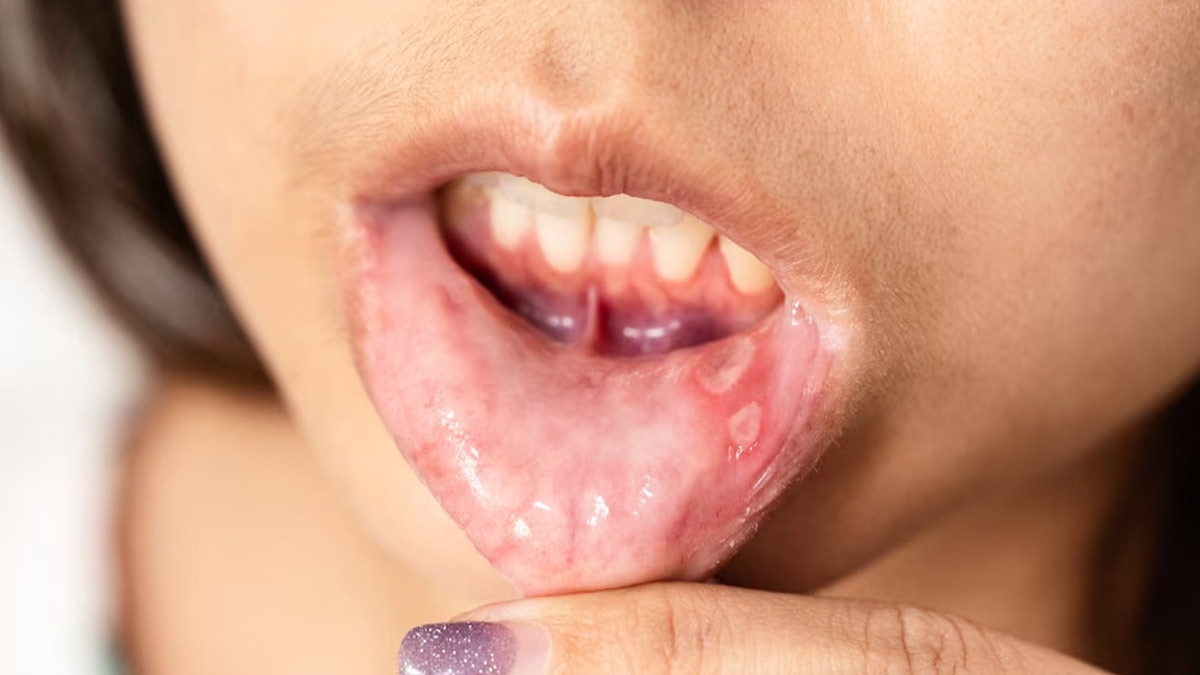
A troubled stomach can make you uncomfortable. It can affect daily activities and, in the long run, can also impact the quality of your life. While in certain cases, patients often feel nothing or have no symptoms, some people may showcase certain signs that indicate a badly functioning digestive system. One of them is mouth sores that can occur on your gums, lips, tongue, inner cheeks, or roof of your mouth.
Table of Content:-
In an interaction with the OnlyMyHealth team, Dr Vibhu Mittal, Director - Gastroenterology, Hepatology, and Endoscopy, Max Super Speciality Hospital, Patparganj, explains the reasoning behind it and shares tips to manage the same.
Also Read: A Burning Stomach Pain Can Be A Sign Of Stomach Ulcer: Here Are Its Triggers
Why Stomach Issues Cause Mouth Sores

“The link between stomach-related issues and mouth sores involves several factors,” says Dr Mittal.
He explains, “Immune response plays a significant role, as conditions like celiac disease and Irritable Bowel Disease (IBD) trigger the immune system to attack the body's own tissues, including the mucous membranes in the mouth, leading to sores.”
“Nutritional deficiencies are another factor, as gastrointestinal disorders often lead to poor absorption of essential nutrients, weakening the oral mucosa and making it more prone to sores,” he adds.
In some people, bacterial infections such as Helicobacter pylori, or H. pylori, can disrupt the balance in the gut and oral microbiome, resulting in inflammation and sores. A study published in the journal JAMA Otolaryngology—Head and Neck Surgery found that patients with ulcers were likely to have an H. pylori infection, with a 10% prevalence among those with mouth and throat ulcers.
Gastrointestinal Conditions That Can Lead To Mouth Sores

According to Dr Mittal, several gastrointestinal conditions can lead to the development of mouth sores. This includes:
- Celiac disease is an autoimmune disorder triggered by gluten.
- Crohn's disease is a type of IBD that causes inflammation anywhere along the gastrointestinal tract, including the mouth.
- Ulcerative colitis, another form of IBD primarily affecting the colon and rectum
- Gastroesophageal Reflux Disease (GERD), characterised by chronic acid reflux.
- H. pylori infection, a bacterial infection associated with peptic ulcers.
- Nutritional deficiencies, particularly in vitamins such as B12, folate, and iron, are often due to malabsorption in various gastrointestinal conditions.
Also Read: 7 Causes Of Nausea Besides A Typical Stomach Flu
Regular Screening Is Crucial

While certain digestive issues can be diagnosed with symptoms, there are conditions that require regular monitoring and screening. Several diagnostic tests can help determine if mouth sores are linked to gastrointestinal problems. These include:
- Blood tests that can check for nutritional deficiencies, such as iron, B12, and folate, as well as markers of inflammation.
- Endoscopy, which allows direct visualisation of the gastrointestinal tract to identify inflammation, ulcers, or other abnormalities,.
- A biopsy involves the examination of tissue samples from the gastrointestinal tract or mouth sores.
- Stool tests can detect infections, inflammation, or blood in the stool.
- For celiac disease, serologic tests for antibodies and genetic testing are useful in diagnosis.
Management Tips
Dr Mittal says, “Managing these conditions (mouth sores) involves treating the underlying gastrointestinal issues with appropriate medications, such as immunosuppressants for IBD or antibiotics for H. pylori. Addressing nutritional deficiencies through diet or supplements, like B12, iron, and folate, is crucial. Topical treatments, including over-the-counter gels and mouth rinses, can provide symptomatic relief for mouth sores.”
He adds, “Nutritional therapy is also important; a gluten-free diet is essential for managing celiac disease, and supplementation with vitamins and minerals like B12 and iron can address deficiencies. Probiotics may support a healthy gut microbiome. Additionally, maintaining good hydration and oral hygiene can help reduce the occurrence of mouth sores.”
Addressing both the underlying gastrointestinal issues and the mouth sores themselves can significantly improve the quality of life for affected individuals, the doctor concludes.
Also watch this video
How we keep this article up to date:
We work with experts and keep a close eye on the latest in health and wellness. Whenever there is a new research or helpful information, we update our articles with accurate and useful advice.
Current Version